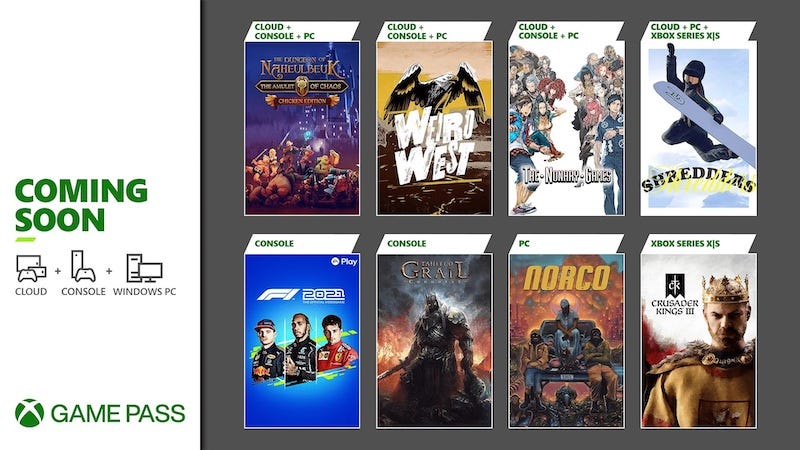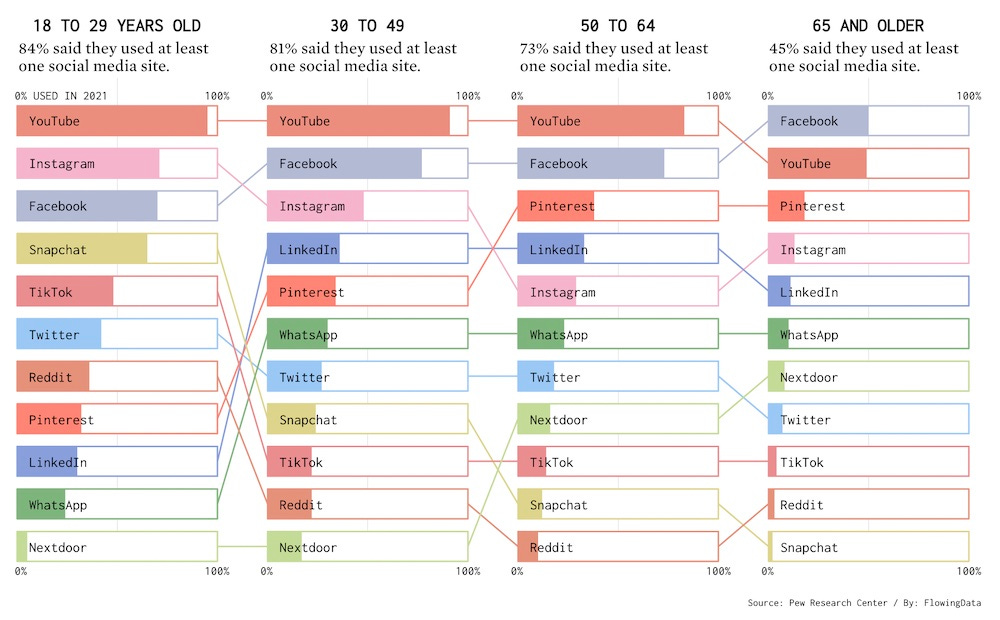The future of PC/console game discovery: a discussion
Publikováno: 18.4.2022
Also: help us make the GameDiscoverCo newsletter better!
[The GameDiscoverCo game discovery newsletter is written by ‘how people find your game’ expert & company founder Simon Carless, and is a regular look at how people discover and buy video games in the 2020s.]
Joyous Monday! The lead story today completes a trilogy that started with whether Xbox really intended to slice up platform cut as it doubled down on Game Pass. It continued by discussing if supply & demand mismatches were making PC/console games a trickier place to be of recent.
Now there’s a (slightly garbled) claim that Oddworld: Soulstorm’s PlayStation+ deal had a “devastating” effect on the game’s non-sub sales. If the game didn’t sell outside of PS+ or on Xbox, maybe it’s a larger supply/demand issue. And the PS+ ‘free’ effect wasn’t that direct? But still - the market is changing! Let’s explore this trilogy ender…
[Want access to ranked ‘Hype’ - follower, wishlist, forum usage - data for all 7500+ unreleased Steam games, including yours, even sorted by Steam tag? Here’s a video showing all the perks of the GameDiscoverCo Plus paid subscription, including that - sign up now to get access!]
Subs & PC/console discovery - David Edery’s 2c!
Back in January, just after the Microsoft buying Activision Blizzard news hit, I spotted a Twitter thread from Spry Fox CEO and co-founder David Edery. I’ve known David for nearly 20 years, from back when he was game portfolio manager of digital console distribution pioneer Xbox Live Arcade in the mid-’00s.
David and Daniel Cook founded Spry Fox in 2010, & they’ve made games like Cozy Grove, Triple Town, the Alphabear series, and worked with funders like Apple, Snapchat, and now Epic, which is publishing their next game. (Did you know that Triple Town pioneered the ‘merge’ mechanic making billions on mobile, btw?)
Anyhow, I caught up with David - who intriguingly has co-run Spry Fox as a remote-only studio since its very beginning. We expanded the conversation past the original thread into, well, this chat about the rise of subscriptions & its ramifications:
Where the market’s heading? It’s not unexpected…
David: None of [these trends] are a surprise. As soon as Game Pass became a success and MS started gobbling up studios, the future was set in stone. Services like Apple Arcade and Netflix's new games offering are just fuel on the fire.
The future for most indies, especially those who like making paid (not F2P) games, will be earning a comfortable living making games for subscription services who own everything. Zero chance of earning a massive profit, though to be fair, the chances have never been high.
This isn't necessarily a terrible thing. AFAIK, the people who make content for Netflix seem to enjoy doing so. But it's a major change, with huge repercussions for how studios evolve and what types of games get made in the future.
And of course, many aspiring devs will be unable to sign deals and thus find themselves shut out of the market. It may start to feel more like the old retail days of the game biz, when breaking in was incredibly difficult. Then again, at least F2P serves as a counterbalance.
If you doubt any of this, ask yourself how much music you've bought recently, or how many movies you've decided to rent or see in theater vs. just watching what's available to you on various services. If you're like most people, ~99% of your linear media time is ad or sub-based.
More stability - or less - for key indie devs?
Simon: So do you think for some prominent indies, a subscription era for premium games will be more stable? And uhh, what happens to premium game publishers, long-term? Are they still of value to platforms because it's easier to do group deals and they are more reliable, or will they be partially disintermediated?
David: For some indies, things will probably be more stable. I struggle to predict what will happen to premium game publishers. I assume the bigger/older ones will probably be fine, because their IP is valuable. I'm not sure what happens to the very small ones.
Also, there is of course the huge question of what Valve and Epic are going to do? You really can't count those companies out, especially Valve with regard to Steam. The folks at Valve are smart, they have a huge and relatively loyal customer base, and they have tons of money, obviously.
So I wonder how long they can help preserve the premium game sales space in its current form, or if they will eventually capitulate and create their own sub?
The problem with trying to make predictions about things like this is that change sometimes takes a lot longer than people think it will. I'm guessing this is going to be a very slow process. I think about my own media consumption habits, and how I had a Netflix subscription for an extremely long time, while still going to movie theaters and stuff like that.
It took the rise of stuff like Disney+ and the pandemic to finally make me adopt multiple subs and stop watching content from other sources. I wouldn't be surprised if it took 10 or 15 years before you started to see a large segment of the population stop paying for most premium games in favor of subs.
BTW, another really interesting question about this: to what extent do multiplayer games help counteract this trend? And do those multiplayer games absolutely need to be ‘free to play’ to to succeed outside a sub going forward?
Simon: It's not clear. I think GaaS co-op games are a good thing to do outside of sub services - certainly better than finite single player games. Just in terms of the way they market themselves to players, and especially streamers.
GaaS but with no IAP - does it make sense in ‘the new era’?
Simon: Right now there's a space for PC and console games that are GaaS-ish but don't really mess much with microtransactions, like Subnautica or Slime Rancher.
Do you think that space will exist in the future, or will games that get updated constantly for years all get more aggressive monetization added? (In part because the full version is available in subscription services, and they want some upsell.)
David: The subscription services really want popular games that get updated forever. They'll be paying people to make those. I don't think I can predict how many of those devs will start to aggressively monetize outside of the sub service. In part because I can't predict if or when the sub services will start to make total exclusivity a mandatory part of their dev deals.
F2P is the obvious "out" for any dev who wants to sidestep all this. And yeah, maybe we also see a phase where "GAAS-ish" games start to look more and more like F2P, but without jumping all the way. (For example: downward price pressure on the base SKU; charging for updates that previously would have been free and/or offering ‘optional’, but highly desirable content for $; etc.)
I think it's worth repeating that change of the type we're talking about usually ends up happening somewhat slower than pundits like to predict. It will be a gradual thing, punctuated by occasional controversy when one of the subs changes their policies in a major way and announces it publicly - or the change gets leaked by a dev.
Simon: Makes sense! Right now there's quite a lot of AAA-adjacent GaaS games who benefit from being in Game Pass and other services with their base game for a while (but rotating in and out.) That way, it gets them a burst of new players who will spend more money on upgrades - IAP, DLC, etc. - over time.
But it’s not always just the base version of the title. E.g. ARK: Ultimate Survivor Edition just came to Game Pass, when previously just the base game was available. But those are existing hit games, rather than games explicitly commissioned by the service. And this shows the complexity at play here - there’s no ‘one size fits all’ solution. And it’s all part of these multi-faceted, incremental long-term trends.
Call for feedback: help us improve this newsletter!
We hear that getting audience feedback is important to iterating and improving your product. We tell you to do that all the time for your games. But do we actually do so for the GameDiscoverCo newsletter?
Well… now we do! Open until April 28th, the inaugural GameDiscoverCo reader survey asks you a few brief, anonymous questions about how you consume our newsletter, what you like about it, and how it could be improved.
So if you have 5 minutes spare and would like to give us feedback, go ahead and fill in the survey. We may provide selected results back to all of you if there’s anything particularly interesting - not to get too meta, haha.
The game discovery news round-up..
And now, for the dismount. Here’s a whole bunch of notable platform and discovery news from the last few days, all tied together in a bow. So, for your delight and delectation:
One follow-up from last week’s Switch survey and the surprising share (47%) of physical Switch carts owned in game libraries? Jim Squires says: “I buy all my games digitally EXCEPT for Switch because we have multiple Switch owners in the family, and physical is the only way to share my library. Other consoles are typically one-per-family ownership.” Great point!
The Chinese market is cracking down on extensive playing of non-authorized games in two new ways: Tencent is shutting down a ‘game accelerator’ product that allows access to foreign games, and even more notably, the gov “said the livestreaming of unauthorised video games was banned, signalling stricter enforcement of rules as part of its broad crackdown on the gaming industry aimed at purging content the government does not approve of.” We’ll see if these have any effect…
An interesting sales/Game Pass tidbit here: Bandai Namco announced that their JRPG Scarlet Nexus (above) shipped 1 million units of base game/DLC since its June 2021 debut, and had 2 million players overall. Looks like the Steam version may have sold 300-350,000 units, and I presume the PS4/PS5 versions also were 6 figures. But doubling reach with Game Pass? Useful.
Another interesting Xbox program: “Microsoft reportedly wants to bring ads to free-to-play Xbox games… Sources familiar with the situation told Insider that the ads wouldn’t disrupt gameplay and may appear on a billboard in a racing game, for example.” What goes around comes around: Massive Incorporated was bought by Microsoft in 2006 for hundreds of millions, and the concept hath returned..
The quirky Playdate handheld has a new update video revealing that “Playdates in Group One will begin shipping… today.” A bunch of reviews/features were timed to the announce, including more on the history of the Playdate crank controller, plus some positive reviews and reviews of all 24 available games. The Playdate’s screen has divided some, though - “because it’s not backlit, you have to think about how you’re using the device.”
Huh, I guess Amazon is publishing new mobile games for the first time since 2015? Specifically, the company “is publishing two new mobile games through its Amazon Kids+ service, based on the original Amazon specials Super Spy Ryan and Do, Re & Mi.” So they’ll be on the Kids+ subscription on the Fire tablet, but also standalone on the iOS/Android stores. More transmedia/subs at work!
Pumping up its PC Game Pass service further, Microsoft is giving free PC Game Pass trials to non-members who played Halo, Forza or AoE4 on PC between their release and February 28th, 2022. Expect to see even more investment into PC Game Pass in the medium-term…
Here’s a good Reddit post: “My life as an imposter: how a game with a 58% review score on Steam made over $500k, and why it’s taken me over 2 years to move on to a new project.” The secret? “The majority [of revenue] (somewhere around 80-85% of it) came from platform deals and minimum guarantees that my publisher, Graffiti Games… negotiated with various stores” like Twitch Prime, Origin Access, etc.
VR microlinks: Meta may be releasing a Quest 2 Pro with dual-element pancake lenses & 2,160 × 2,160 resolution mini-LED displays; apparently Rec Room reached 3 million VR MAUs early in 2022, though “VR is a pretty low percentage of our monthly players”; a Meta AR roadmap leaked to The Verge - “Employees are racing to deliver the first generation by 2024 and are already working on a lighter, more advanced design for 2026, followed by a third version in 2028.”
Finally, this FlowingData post comments: “Social media apps are on a lot of phones these days, but some tend towards a younger audience and others.. older.” The differences for U.S. adults in 2021? We have an infographic for that:
[We’re GameDiscoverCo, an agency based around one simple issue: how do players find, buy and enjoy your premium PC or console game? We run the newsletter you’re reading, and provide consulting services for publishers, funds, and other smart game industry folks.]





